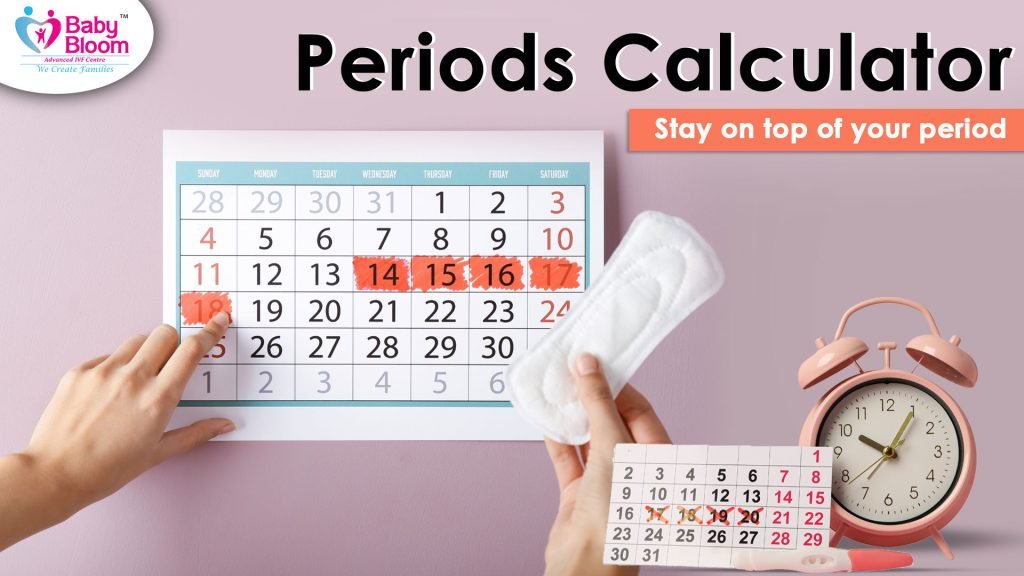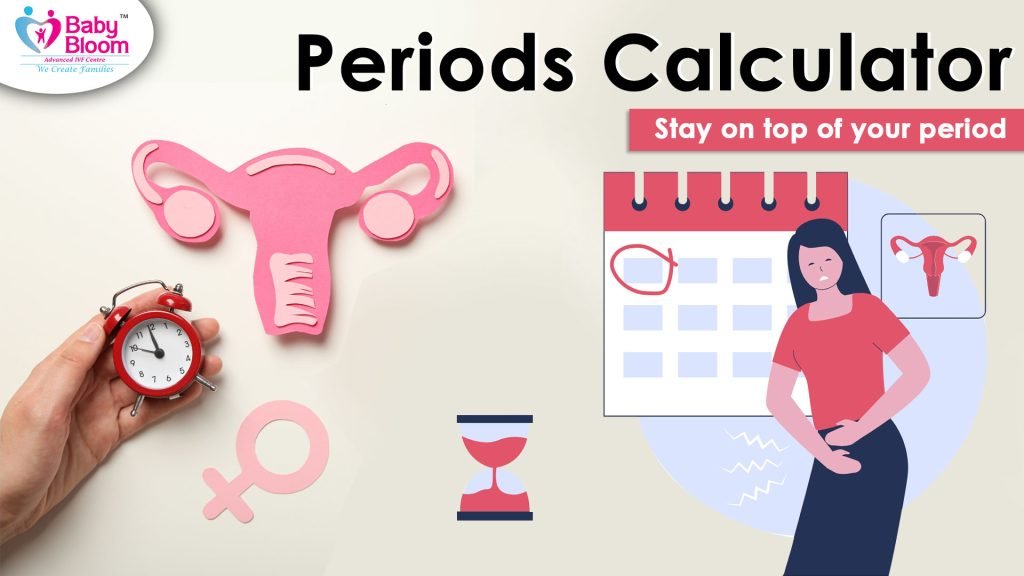Period Calculator: Simplify Period Tracking & Health Planning

Dr. Pujil Gulati, IVF Specialist with over 13 years of experience in Assisted Reproductive Techniques BabyBloom IVF Gurgaon
What is a Period Calculator?
A period calculator is an easy-to-use tool designed to help you track and predict your menstrual cycle. By providing details such as the date of your last period and the length of your cycle, it accurately estimates when your next period will start and highlights your fertile days.

The Importance of Period Tracking.
Tracking your menstrual cycle isn’t just about knowing when your next period will start. It’s an essential aspect of understanding your reproductive health, managing symptoms like PMS, and planning around significant life events. With the rise of digital tools, period tracking has never been easier or more accurate.
How a Period Calculator Works
Period calculators analyze the information you provide to predict future cycles. They consider:
- Start Date of Last Period: This establishes the baseline.
- Cycle Length: The average time between the start of one period and the next.
- Duration of Menstrual Flow: Helps with predicting the end of your period.
Over time, they become more accurate as they learn your specific patterns.
Understanding the Menstrual Cycle
Phases of the Menstrual Cycle
Menstrual Phase
The menstrual phase marks the start of the cycle, during which the uterus sheds its lining. This phase lasts 3-7 days and is accompanied by symptoms like cramps and fatigue.
Follicular Phase
This phase begins on the first day of your period and continues until ovulation. The body prepares for a potential pregnancy by maturing an egg and thickening the uterine lining.
Ovulation Phase
Around the middle of your cycle, ovulation occurs. This is when the ovary releases a mature egg, making this the most fertile time of the cycle.
Luteal Phase
After ovulation, the luteal phase begins. The body produces hormones to support a potential pregnancy. If fertilization doesn’t occur, these hormone levels drop, triggering the menstrual phase.
How the Menstrual Cycle Affects Your Health
Your menstrual cycle isn’t just about periods. It influences your mood, energy levels, and overall health. For example, hormonal changes during the luteal phase can cause PMS symptoms like bloating, mood swings, and acne.
Benefits of Using a Period Calculator
Simplifying Period Tracking
Gone are the days of manually marking calendars. A period calculator automates tracking, giving you instant insights into your cycle with just a few inputs.
Supporting Fertility Awareness
Whether you’re trying to conceive or avoid pregnancy, understanding your ovulation and fertile window is critical. A period calculator helps you pinpoint these days with accuracy.
Enhancing Symptom Management
Tracking symptoms like cramps, fatigue, or mood swings helps you prepare better and recognize patterns. This is especially useful for managing PMS or diagnosing conditions like PCOS.
Features of Modern Period Calculators
Predicting Ovulation and Fertile Windows
Most period calculators now include ovulation predictions, offering detailed insights into your fertility patterns. These features are ideal for those focused on family planning.
Logging Symptoms for Health Insights
Many calculators let you log daily symptoms, such as headaches, cravings, or cramps. Over time, this data provides a clear picture of your health trends.
Integrating with Other Health Apps
Modern period trackers can sync with fitness and wellness apps, creating a comprehensive view of your health. For example, linking with a fitness tracker can correlate exercise with menstrual symptoms.
How to Use a Period Calculator Effectively
Inputting the Right Information
For accurate predictions, provide the following key details:
- Start Date of Your Last Period: This serves as the baseline.
- Average Cycle Length: If unsure, calculate it by tracking for a few months.
- Duration of Your Period: This helps the tool estimate the end date of your period.
Using accurate and up-to-date information ensures the tool provides reliable predictions.
Regular Tracking for Better Accuracy
Consistency is essential for getting the most out of a period calculator. Regularly updating your data, especially if your cycle changes, helps refine predictions. Try setting reminders to log your period and symptoms promptly.
Using Advanced Features
Modern period calculators offer features that go beyond basic tracking. Use them to:
- Monitor PMS symptoms like bloating, headaches, or mood swings.
- Set reminders for upcoming periods or ovulation days.
- Integrate with health apps to track fitness, sleep, or diet alongside your cycle.

Period Calculators for Irregular Cycles
Adapting Tools for Unpredictable Patterns
If you have irregular cycles, some period calculators can still help. They use algorithms to analyze historical data, offering a range of dates rather than precise predictions. While not perfect, they provide a useful guide.
Identifying Trends Over Time
Even with irregular cycles, consistent tracking can reveal patterns. These patterns help you understand triggers like stress or diet changes that may be affecting your cycle. This insight can guide discussions with a healthcare provider.
Popular Period Calculators to Consider
Top Mobile Apps for Easy Tracking
1. Clue: Offers a sleek interface and in-depth symptom tracking.
2. Flo: Known for its fertility predictions and educational content.
3. Period Tracker: Simple and effective for users who prefer a no-frills approach.
Online Period Calculators and Tools
For those who prefer not to download apps, several online tools provide quick and easy calculations. Simply input your details, and these calculators instantly generate your next cycle date.
Privacy and Security Concerns
Keeping Your Data Safe
With sensitive information like menstrual cycles and symptoms, privacy is crucial. Look for tools that offer encrypted data storage and don’t share your information with third parties.
Choosing a Reliable Period Calculator
Select tools from reputable developers. Read user reviews and privacy policies to ensure the tool you choose prioritizes security.
Addressing Common Misconceptions
Myth 1: They’re Only for Women Trying to Conceive
While period calculators are invaluable for family planning, they’re also helpful for anyone wanting to understand their reproductive health better. From teens to postmenopausal women, they serve a wide range of users.
Myth 2: They Don’t Work for Teens or Older Women
Period calculators are versatile and can be adjusted for users of all ages. For teens with unpredictable cycles or older women approaching menopause, these tools provide insights into shifting patterns.
Myth 3: They’re a Substitute for Medical Advice
While period calculators are powerful tools, they don’t replace medical expertise. Always consult a healthcare provider for concerns like severe pain, irregular cycles, or unusual symptoms.
FAQs About Period Calculators
Q1: How accurate are period calculators?
Period calculators are generally accurate for regular cycles. For irregular cycles, they provide estimates but may require additional data for improved precision.
Q2: Can I use a period calculator if my cycle is irregular?
Yes, many calculators analyze patterns over time to give rough predictions. Pairing them with professional advice is recommended for irregular cycles.
Q3: Are there free period calculators available?
Yes, many apps and online tools offer free versions with basic features. Paid options often include advanced features like symptom tracking or fertility predictions.
Q4: How can I protect my data while using a period calculator?
Choose tools with strong privacy policies, encrypted data storage, and no third-party sharing. Avoid entering highly sensitive information if unsure.
Q5: What should I do if my period predictions are consistently inaccurate?
Review the data you’ve entered for errors. If predictions remain off, consult a doctor to explore potential health factors affecting your cycle.
Write your message:-

Welcome to BabyBloom IVF, where your journey to parenthood is nurtured with care, expertise, and the latest advancements in fertility treatment. Located in the heart of Gurgaon, Babybloom IVF is the Best IVF Centre in Gurgaon & leading fertility center dedicated to helping couples achieve their dreams of starting or growing their families.
Contact Us
Address No.1 I, block, 189, near Baani Square, South City II, Sector 50, (Gurgaon) Gurugram, Haryana 122018
Address No.2 Babybloom IVF, Nursing Home, Civil Rd, Company Bagh, Rohtak, Haryana 124001

Brought Happiness to the world
@BabyBloom IVF All Rights Reserved @2025


